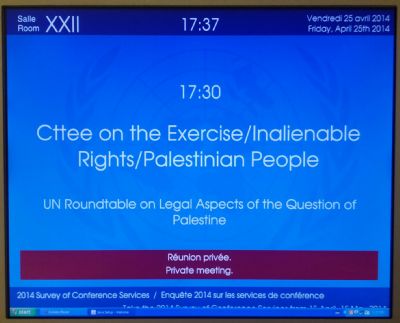In fact, though the event was advertised as closed except for two sessions, the published "List of Participants" reveals that 9 civil society organizations – all 9 with well-established anti-Israel credentials and 7 based in Ramallah - were actually taking part.
The opening session featured the representative of the Palestinian Authority - Issa Qaraqe, Palestinian Minister for Prisoners' Affairs, and as we reported earlier, he accused Israel of torturing and raping little children and subjecting Palestinian detainees to medical experiments.
A record of the private sessions, however, was obtained by Human Rights Voices. They included:
- • Sharon Weill, University of Geneva and the Graduate Institute, questioned the authority of military courts in Israel to try civilians, because "they are neither independent not impartial," and are "not providing due process" but "are political courts which are structurally prevented from providing a fair trial."
• Valentina Azarova, Lecturer in Human Rights and International Law, Al-Quds University argued in favor of the Palestinian "right to return" including "Palestinian refugees in the Diaspora with a territorial link to Israel." In other words, she advocated a legal right to abolish a Jewish state. She also supported the "BDS" (boycott, divestment and sanctions) campaign against Israel, pushing third states and international actors to adhere to "the duty of non-recognition, non-aid or assistance...the same goes for private entities like businesses."
• Larry Johnson, Adjunct Professor, Columbia Law School, and the former UN Assistant Secretary-General for Legal Affairs, criticized U.S. law in relation to "Palestine." Michael Bothe, Professor Emeritus, Johann Wolfgang Goethe University, suggested a "catalogue of possible measures," including "conditionality of trade and assistance" such as stopping arms export and military aid for Israel's commission of "genocide, war crimes, crimes against humanity, attacks against civilians".
• Iaian Scobbie, Professor of Public International Law, University of Manchester; suggested the Israelis are guilty of grave breaches of the Fourth Geneva Convention, which he proceeded to quote: "willful killing, torture or inhuman treatment, willfully causing great suffering or serious injury to body or health, unlawful deportation or transfer or unlawful confinement."
• Chantal Meloni, Professor of International Criminal Law, University of Milan, who was also involved with the notorious Russell Tribunal for Palestine, accused Israel of being a racist state guilty of the humankind's most despicable crimes: "de facto bantustanisation of the West Bank"; "Judaisation of East Jerusalem," "war crimes and possible crimes against humanity." She said that it was "essential that Israel's crimes be heard by...the ICC (International Criminal Court.)"
Meloni openly rejected even a facade of sovereign equality: "A focus solely on the battlefield whereby both sides could be presented as bearing responsibility for international humanitarian law (IHL) violations would be misleading as it would not tackle the root cause of the conflict. That is why it is critical to include other crimes. I think in particular of the crimes of apartheid, persecutions, torture (as crimes against humanity), and of course the settlements (as a war crime)."
Representatives of the United Kingdom and Sweden took part, along with 9 members of the UN staff of the Office of the High Commissioner for Human Rights.

